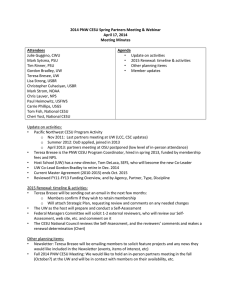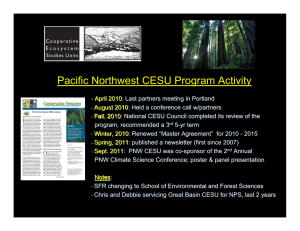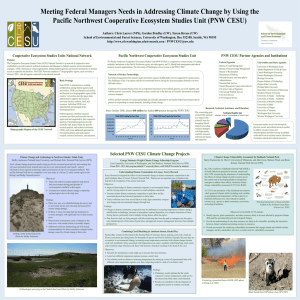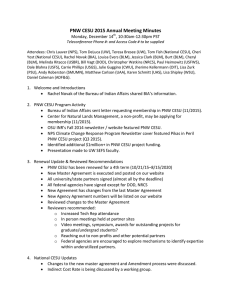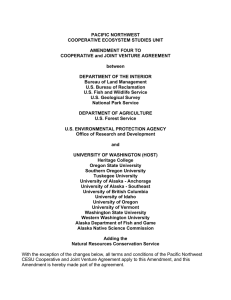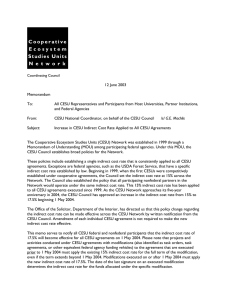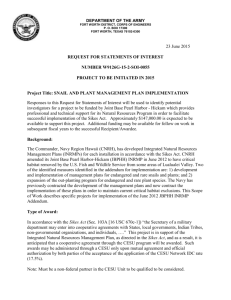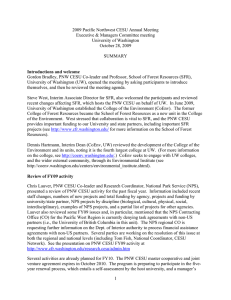The CESU Concept Benefits of the PNW CESU Partnership PNW CESU Partners
advertisement
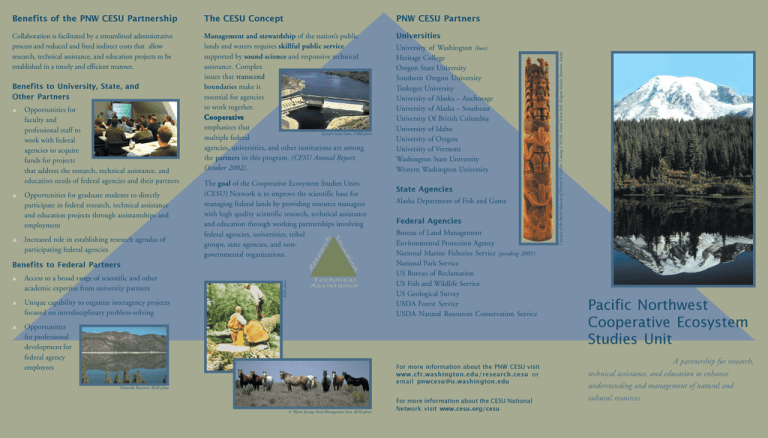
The CESU Concept PNW CESU Partners Collaboration is facilitated by a streamlined administrative process and reduced and fixed indirect costs that allow research, technical assistance, and education projects to be established in a timely and efficient manner. Management and stewardship of the nation’s public lands and waters requires skillful public service supported by sound science and responsive technical assistance. Complex issues that transcend boundaries make it essential for agencies to work together. Cooperativ Cooperativee emphasizes that Grand Coulee Dam, USBR photo multiple federal agencies, universities, and other institutions are among the partners in this program. (CESU Annual Report, October 2002). Universities Benefits to University, State, and Other Partners ▲ ▲ ▲ Opportunities for faculty and professional staff to work with federal agencies to acquire funds for projects that address the research, technical assistance, and education needs of federal agencies and their partners Opportunities for graduate students to directly participate in federal research, technical assistance and education projects through assistantships and employment Increased role in establishing research agendas of participating federal agencies The goal of the Cooperative Ecosystem Studies Units (CESU) Network is to improve the scientific base for managing federal lands by providing resource managers with high quality scientific research, technical assistance and education through working partnerships involving federal agencies, universities, tribal groups, state agencies, and nongovernmental organizations. ▲ Access to a broad range of scientific and other academic expertise from university partners ▲ Unique capability to organize interagency projects focused on interdisciplinary problem-solving ▲ Opportunities for professional development for federal agency employees BLM photo Benefits to Federal Partners University of Washington (host) Heritage College Oregon State University Southern Oregon University Tuskegee University University of Alaska – Anchorage University of Alaska – Southeast University Of British Columbia University of Idaho University of Oregon University of Vermont Washington State University Western Washington University State Agencies Alaska Department of Fish and Game Federal Agencies Bureau of Land Management Environmental Protection Agency National Marine Fisheries Service (pending 2005) National Park Service US Bureau of Reclamation US Fish and Wildlife Service US Geological Survey USDA Forest Service USDA Natural Resources Conservation Service For more information about the PNW CESU visit www.cfr.washington.edu/research.cesu or email pnwcesu@u.washington.edu Prineville Reservoir, BLM photo E. Warm Springs Herd Management Area, BLM photo For more information about the CESU National Network visit www.cesu.org/cesu Courtesy of the Burke Museum of History & Culture, Catalog 2.5E536, Model Totem Pole, Kaigani Haida, Howkan, Alaska Benefits of the PNW CESU Partnership Pacific Northwest Cooperative Ecosystem Studies Unit A partnership for research, technical assistance, and education to enhance understanding and management of natural and cultural resources. PNW CESU Projects Mt. Rainier, NPS photo encompasses a region extending across 5 states (Washington, Oregon, Northern California, Western Idaho, and Southeast Alaska) and is hosted by the University of Washington. As a member of the National CESU Network, the PNW CESU is a working partnership among leading academic institutions, federal, state and non-governmental organizations. Spotted Owl, NPS photo The Pacific Northwest Cooperative Ecosystem Studies Unit (PNW CESU) The CESU National Network is organized around biogeographic regions across the United States. Each region is served by a distinct CESU, with all CESUs linked together in the National Network. Hoh Rain Forest, NPS photo (See complete list of PNW CESU partners on the back of this brochure) CESU National Network Map PNW CESU projects are conducted within a diverse array of ecosystems including terrestrial, riparian, and coastal environments that contain old and young temperate rainforests, nearshore oceanic environments, volcanically-derived mountain ranges, the Columbia basin plateau, and the Alaska sub-arctic tundra. Many areas within the PNW CESU are experiencing rapid population and economic growth, presenting challenges for public resource managers. PNW CESU projects involve the physical, biological, social and cultural sciences to address complex social, cultural, and natural resource management issues such as: ▲ Restoring at-risk ecosystems ▲ Identifying subsistence and other traditional uses of federal lands by Native Americans and residents of rural communities ▲ Monitoring impacts from visitor and recreational use ▲ Developing strategies for conserving bio-diversity ▲ Evaluating impacts to threatened and endangered species ▲ Developing air and water quality measurement models ▲ Landscape analysis of black bear distribution patterns in Olympic National Park Olympic National Park, University of Idaho ▲ Traditional cultural property studies in Lower Glacier Bay Glacier Bay National Parks & Preserve, University of Alaska, Southeast ▲ Review and evaluation of travel simulation models for planning and management of Mount Rainier National Park Mt. Rainier National Park, University of Washington ▲ Impact of soil erosion on declining Sockeye Salmon population in Lake Ozette NPS, Western Washington University Project Spotlight ▲ ▲ Native Americans and the Pacific Northwest environment: an interdisciplinary study of indigenous agriculture and environmental management National Park Service, University of Washington NPS photo, Nez Perce National Historic Park, image #0545 ▲ Western airborne containments assessment project fish studies National Park Service, Oregon State University Use a landscape management system to develop a rapid planning and implementation tool for a variety of silvicultural pathways and management options and a companion course for 20 mid-career BLM resource professionals Bureau of Land Management, University of Washington ▲ Alagnak Wild River Corridor Management Plan Katmai National Park & Preserve, University of Alaska, Anchorage
